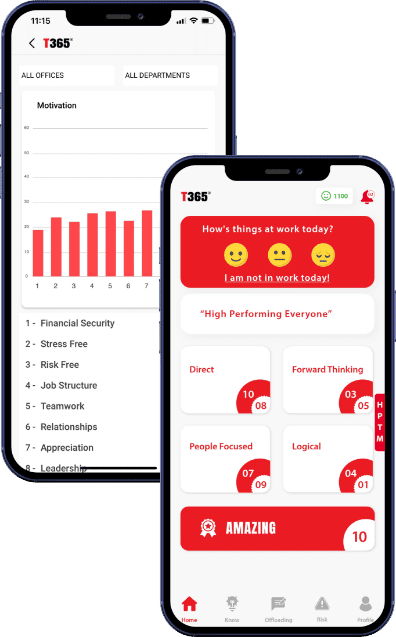What Makes A Successful Team?
“Teamwork makes the dream work,” as the saying goes.
But what really is teamwork? And what does it take to create a successful team?
Sports coaches have zeroed in on the importance of team dynamics for years, and that approach has paid serious dividends.
But, to our minds, businesses are still stuck in that ‘dog-eat-dog’ mindset where egos are massaged and selfish behaviours excused: completely to the detriment of wider success across their respective organisations.
Read on to learn about proven approaches to creating a great working culture in which individuals and teams can both really thrive, thereby generating sustainable success right across an organisation.

What Is A Team?
This might seem like one of those ridiculous questions that automatically start appearing when you begin typing a perfectly sensible search into Google. Who doesn’t know what a team is?!
But it can’t be that silly a question if Professor Leigh Thompson of the Kellogg School of Management sought to define it as follows:
A team is a group of people who are interdependent with respect to information, resources, knowledge and skills and who seek to combine their efforts to achieve a common goal.
An academic definition is one thing. But, a bit like moral philosophy, it’s all well and good understanding a definition or maxim – it’s quite another to actually follow it to the letter in real life settings.
Putting a different spin on it, if you were to ask a highly talented but, at times, challenging member of your team to define what a team is, they might well roll out Prof Thompson’s definition perfectly.
But – and it’s a big but – you know (or at least suspect very strongly) from working with that person that they actually view teams and teamwork very differently to the way they define it. In other words, they say one thing but act in another. And that can have a very erosive impact on team culture.

A Shared Understanding
Going back to sport as an analogy, imagine you were part of a football team that had found a very good tactic which worked time and time again.
You’d keep doing that until other teams worked it out and found a way of stopping it, wouldn’t you? It’s almost the converse of Einstein’s massively overused (but no less true) definition of insanity.
But then, what if you brought in a hugely talented new player who steadfastly refused to play his part in that tactic, thereby causing it to fail?
Further still, this maverick keeps on going on risky mazy dribbles that sometimes work out beautifully and make him look like Messi but, more often than not, result in you losing the ball and conceding goals at vital times.
Is he a team player? The obvious answer is a resounding ‘no!’.
But perhaps a better question is: ‘Could he become a team player, and contribute his considerable gifts to the great benefit of the rest of the team?’.
Ahh, now we’ve got you thinking.
The best teams are those that are able to create and maintain a shared vision and understanding about ways of working that will benefit everyone.
And if you can continually engage with people in your team and ask them if they’re ‘doing ok’ with a view to getting an honest answer that will help solve a sticky issue, then all the better.
No team member should ever be afraid to ask the wider team to ask why they’re doing something in a certain way. Because, the better they understand the reason, the more likely they are to buy into it.

Working As A Team To Shape Team Culture
Is it down to the manager of a team or the CEO of a company or even the board to decide how team cultures should be shaped?
Hey, that’s certainly the way things used to work. And it’s probably how some people still want it to work. But it’s simply not going to work in this day and age, when companies are – rightly – so concerned with employee satisfaction, staff turnover and the employer brand.
That’s not to say that there should be a free-for-all where everyone gets to do whatever they like, whenever they like. No. That’s a recipe for chaos and, ultimately, unhappiness.
But there are four guiding principles that every – yes, every – successful team needs to adhere to:
- Make sure you ALL believe in what you are trying to achieve
Because, if you don’t 110% believe in what you’re doing as a team, then you may as well pack up and go home now.
- Make sure EVERYONE is on board every step of the way
Everyone in the team needs to be involved in every single decision. Don’t fall into the trap of relying (or, ahem, letting) just one or two people make decisions, because that’s an old and broken way of working.
- Make sure you are all managing your conditions
We all have stuff going on in our lives that unavoidably distracts us from work. It’s called ‘being human’.
And yet companies that have been in denial about this for decades wonder why staff turnover is so high nowadays, in these much more enlightened times. Well, the solution is to create a team culture where everyone helps each other and can easily absorb tasks or workloads when somebody is off their game or away.
- Make sure you are all 100% honest
‘Operational honesty’ is where everyone in the team is dedicated to being honest with one another at all times.
Honest, that is, in regards to tackling issues together in a calm and constructive way to make sure that any potential problems are nipped in the bud as early as possible rather than left to fester.
Want To Learn More About How To Create High Performing Teams?
There’s a whole page on our website dedicated to the subject of How To Build A High Performing Team, including more detail on the key principles listed above.
And, if you’d like to know more about how our expert team can help you build and maintain a great team, please give us a call on +44 (0) 1325 734 846 or email team@tribe365.co

Interested in finding out more?
Book a meeting in with the Tribe team
today on +44 (0) 1325734847 or at
team@tribe365.co

















